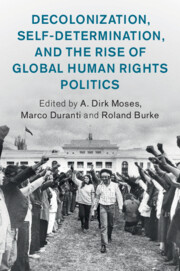Book contents
- Decolonization, Self-Determination, and the Rise of Global Human Rights Politics
- Human Rights in History
- Decolonization, Self-Determination, and the Rise of Global Human Rights Politics
- Copyright page
- Contents
- Notes on Contributors
- Acknowledgments
- Introduction
- Part I Anti-Colonial Struggles and the Right to Self-Determination
- Part II Postcolonial Statehood and Global Human Rights Norms
- 6 Cutting Out the Ulcer and Washing Away the Incubus of the Past
- 7 Codifying Minority Rights
- 8 Between Ambitions and Caution
- 9 “From This Era of Passionate Self-Discovery”
- 10 Reentering Histories of Past Imperial Violence
- Part III Colonial and Neocolonial Responses
- Index
10 - Reentering Histories of Past Imperial Violence
Kenya, Indonesia, and the Reach of Transitional Justice
from Part II - Postcolonial Statehood and Global Human Rights Norms
Published online by Cambridge University Press: 24 June 2020
- Decolonization, Self-Determination, and the Rise of Global Human Rights Politics
- Human Rights in History
- Decolonization, Self-Determination, and the Rise of Global Human Rights Politics
- Copyright page
- Contents
- Notes on Contributors
- Acknowledgments
- Introduction
- Part I Anti-Colonial Struggles and the Right to Self-Determination
- Part II Postcolonial Statehood and Global Human Rights Norms
- 6 Cutting Out the Ulcer and Washing Away the Incubus of the Past
- 7 Codifying Minority Rights
- 8 Between Ambitions and Caution
- 9 “From This Era of Passionate Self-Discovery”
- 10 Reentering Histories of Past Imperial Violence
- Part III Colonial and Neocolonial Responses
- Index
Summary
This chapter explores the expansion of transitional justice from present violence to past violence. This has been called post-transitional justice. It considers cases where long neglected victims of colonial repression have reentered history as claimants in controversial legal cases about atrocities in Kenya and Indonesia. The UK High Court decision on compensation for Mau Mau victims of British colonial repression (2010) and compensation for widows of the Rawagede village massacre of 400 villagers in 1947 by Dutch colonial troops in East Java (2011), extended legal accountability for empires, and remedies for individuals. While the globalization of human rights discourse has created the transnational legal environment in which these claims were made possible, it has also exposed the tension between the compromises of national self-determination and individuated justice. By unstitching the problematic settlement of collective national independence, and revealing asymmetries of suffering, it reveals the difficulty of treating political transition as caesura, and the ongoing legacies of trauma which persist well after the departure of the imperial power.
Keywords
- Type
- Chapter
- Information
- Publisher: Cambridge University PressPrint publication year: 2020



